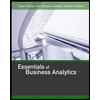
Concept explainers
a.
To determine: The NPV of purchasing and leasing.
Introduction:
The Net Present Value (NPV) is the distinction between the present value of
b.
To determine: The equivalent monthly annual benefit of both opportunities.
c.
To determine: Whether purchasing or leasing option should be opt.
Leasing option:
Leasing has option that in five years a five-year-old cab will cost either $10,000 or $16,000 with equal likelihood, will have maintenance costs of $500 per month, and will last three more years.
Want to see the full answer?
Check out a sample textbook solution
Chapter 22 Solutions
Corporate Finance: The Core (4th Edition) (Berk, DeMarzo & Harford, The Corporate Finance Series)
- 1. Give one new distribution channels for Virtual Assistance (freelance business) that is not commonly used. - show a chart/diagram to illustrate the flow of the distribution channels. - explain the rationale behind it. (e.g., increased market reach, improved customer experience, cost-efficiency). - connect the given distribution channel to the marketing mix: (How does it align with the overall marketing strategy? Consider product, price, promotion, and place.). - define the target audience: (Age, gender, location, interests, etc.). - lastly, identify potential participants: (Wholesalers, retailers, online platforms, etc.)arrow_forwardAn individual is planning for retirement and aims to withdraw $100,000 at the beginning of each year, starting from the first year of retirement, for an expected retirement period of 20 years. To fund this retirement plan, he intends to make 20 equal annual deposits at the end of each year during his working years. Assume a simple annual interest rate of 20% during his working years and a simple annual interest rate of 5% during retirement. What should his annual deposit amount be to achieve his desired retirement withdrawals? Please write down the steps of your calculation and explain result economic meaning.arrow_forwardAssume an investor buys a share of stock for $18 at t=0 and at the end of the next year (t=1), he buys 12 shares with a unit price of $9 per share. At the end of Year 2 (t=2), the investor sells all shares for $40 per share. At the end of each year in the holding period, the stock paid a $5.00 per share dividend. What is the annual time-weighted rate of return? Please write down the steps of your calculation and explain result economic meaning.arrow_forward
- On how far do you endorse this issue? Analyze the situation critically using official statistics and the literature.arrow_forwardIs globalization a real catalyst for enhancing international business? It is said that relevance of globalization and regionalism in the current situation is dying down. More specifically, concerned has been raised from different walks of life about Nepal’s inability of reaping benefits of joining SAFTA, BIMSTEC and WTO.arrow_forwardIn the derivation of the option pricing formula, we required that a delta-hedged position earn the risk-free rate of return. A different approach to pricing an option is to impose the condition that the actual expected return on the option must equal the equilibrium expected return. Suppose the risk premium on the stock is 0.03, the price of the underlying stock is 111, the call option price is 4.63, and the delta of the call option is 0.4. Determine the risk premium on the option.arrow_forward
- General Financearrow_forwardAssume an investor buys a share of stock for $18 at t = 0 and at the end of the next year (t = 1) , he buys 12 shares with a unit price of $9 per share. At the end of Year 2 (t = 2) , the investor sells all shares for $40 per share. At the end of each year in the holding period, the stock paid a $5.00 per share dividend. What is the annual time-weighted rate of return?arrow_forwardPlease don't use Ai solutionarrow_forward
- A flowchart that depicts the relationships among the input, processing, and output of an AIS is A. a system flowchart. B. a program flowchart. C. an internal control flowchart. D. a document flowchart.arrow_forwardA flowchart that depicts the relationships among the input, processing, and output of an AIS is A. a system flowchart. B. a program flowchart. C. an internal control flowchart. D. a document flowchart.arrow_forwardPlease write proposal which needs On the basis of which you will be writing APR. Write review of at least one article on the study area (Not title) of your interest, which can be finance related study area. Go through the 1. Study area selection (Topic Selection) 2. Review of Literature and development of research of framework 3. Topic Selection 4. Further review of literature and refinement of research fraework 5. Problem definition and research question…arrow_forward
 Essentials of Business Analytics (MindTap Course ...StatisticsISBN:9781305627734Author:Jeffrey D. Camm, James J. Cochran, Michael J. Fry, Jeffrey W. Ohlmann, David R. AndersonPublisher:Cengage LearningPrinciples of Accounting Volume 1AccountingISBN:9781947172685Author:OpenStaxPublisher:OpenStax College
Essentials of Business Analytics (MindTap Course ...StatisticsISBN:9781305627734Author:Jeffrey D. Camm, James J. Cochran, Michael J. Fry, Jeffrey W. Ohlmann, David R. AndersonPublisher:Cengage LearningPrinciples of Accounting Volume 1AccountingISBN:9781947172685Author:OpenStaxPublisher:OpenStax College EBK CONTEMPORARY FINANCIAL MANAGEMENTFinanceISBN:9781337514835Author:MOYERPublisher:CENGAGE LEARNING - CONSIGNMENT
EBK CONTEMPORARY FINANCIAL MANAGEMENTFinanceISBN:9781337514835Author:MOYERPublisher:CENGAGE LEARNING - CONSIGNMENT Managerial AccountingAccountingISBN:9781337912020Author:Carl Warren, Ph.d. Cma William B. TaylerPublisher:South-Western College Pub
Managerial AccountingAccountingISBN:9781337912020Author:Carl Warren, Ph.d. Cma William B. TaylerPublisher:South-Western College Pub



